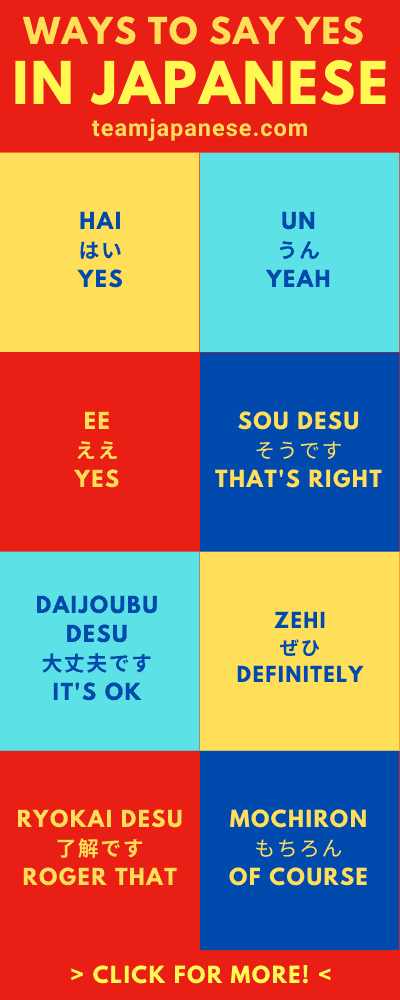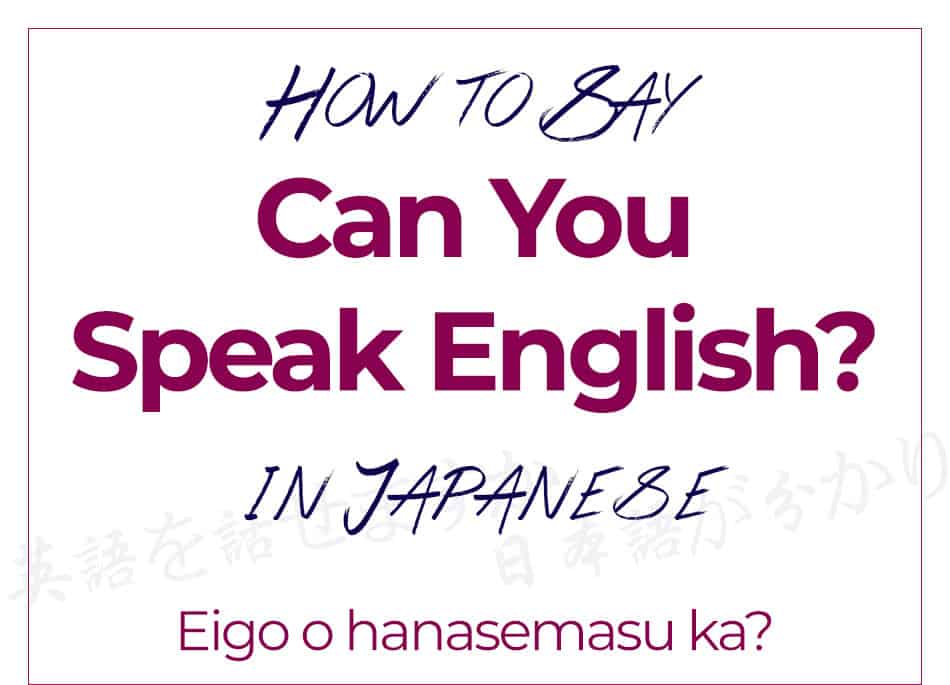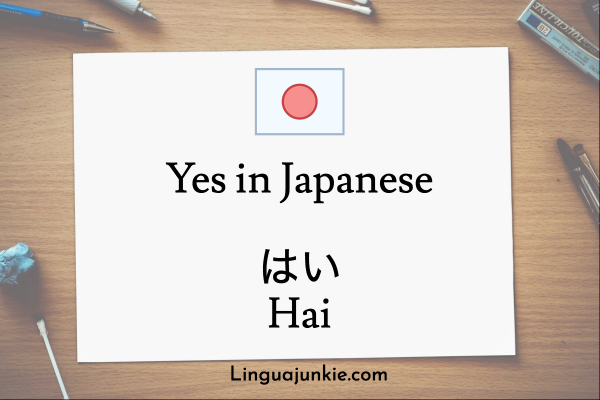わたしは にほんごがすこししかはなせ . すみません。 Kanji: はい、(英語を)話すことができます。 In traditional settings, such as formal ceremonies or interactions with superiors, はい is the preferred affirmative response. Kana: はい、(えいご を)はなす こと が できます。For 素敵でしょう!. Rocket Japanese Courses Rocket Japanese free trial Rocket Japanese (Level 1) Rocket Japanese (Level 2) Rocket Japanese (Level 3) Rocket Japanese (Play the Part) . Rubbing the back of the neck.Hai directly translates to ‘yes’ in English. It is the most recommended word to use since it is polite and perfect, may it be when you speak with your close friends or in the workplace. Sumisu-san: Watashi wa nihongo ga sukoshi shika hanasemasen.Want to say YES in Japanese? Well, here are 17 fun ways to say yes, agree and confirm.The simplest and most straightforward way of saying yes in Japanese is はい hai. How to say yes in Japanese. Ee (ええ) – Yes (Informal) “Ee” is “Hai” but in a much more laid back and casual manner.
How to Say Yes in Japanese: ‘Hai’ and Beyond!
In most situations where you say I speak some Japanese, the most apt equivalent is 日本語が少し話せます.Are you interested in learning Japanese or improving your language skills? Understanding how to say “yes” in Japanese is an essential part of effective communication. So, if you’re listening to someone, just say “hai” a few times. Hai is the textbook translation for yes in Japanese. (I can’t speak Japanese that much) or ( I can’t speak much . Perfect your pronunciation of how to say yes in Japanese using our voice recognition tool.Firstly, there are many ways to say “yes” in Japanese. Here are some of the most common . This word sounds almost identical to the English greeting “hi” so it should be super easy for you to begin using right away. It’s a standard and polite Japanese greeting, but it isn’t one that can be used around the clock. If you want to say It’s beautiful, we say 素敵だ or 素敵です. If you wish to express something along the lines of ‘yes, yes’ as . So, the pronunciation of yes is hai. Just be sure that you don’t confuse it with the Japanese . Rocket Record lets you perfect your Japanese . If you want to specifically say you’re not good at “speaking” Japanese the most normal way would to say something like : 日本語があまり話せないです。 Ten-in: Sumimasen. The word “hai” (はい) means “yes” in Japanese but it can also be used as a greeting or an acknowledgment of what someone has said without actually agreeing with them. This is the best way to say yes in formal conversations, but it is also acceptable in casual ones.When you say 私は日本語を話します (Watashi wa Nihongo o hanashimasu), you’re literally saying I, Japanese, speak. Check out our playlists for the full course.
How to Say “Can You Speak English?” in Japanese (+Examples)
In a more formal style, one may also use は!. Sign up for your Free Lifetime . Hai is the simple, direct word for “yes” and is commonly used in . Also, Japanese people like to hear this word to know that you understand or are listening to what they are saying.Save yourself at the last minute with ‘Chigau yo!’ to mean ‘That’s not true’, or as I like to think of it, ‘No, silly, I was just joking!’. 日本語を話せますか? はい、日本語を少し話せます。 Unfortunately, I speak only a little Japanese.Casual: Hai (はい) Polite: Hai, hai desu (はい、はいです) Honorific: Hai, hai gozaimasu (はい、はいございます) 4.英語を話せますか? はい、英語を話せます。Schlagwörter:Japanese HaiLearning JapaneseJapanese Mochiron
Yes in Japanese: Understanding the Different Ways to Agree
Bewertungen: 511 I speak little Japanese. No nay-sayers allowed to read this.Schlagwörter:Speak JapaneseJapanese in Japanese
How do you say yes in Japanese language?
In this free lesson, you’ll learn how to say yes in Japanese. How do you say this in Japanese? Yes, I speak Japanese. / Good afternoon.

Traditional Uses and Contexts.Can you guys please tell me how you write the two phrases below and how you pronounce them?: I speak Japanese. If you wish to express something along the lines of ‘yes, yes’ as you would when encouraging someone to continue talking, be cautious when you use hai! In traditional settings, such as formal ceremonies or interactions with . I do not speak English. We’ll talk more about greetings and the time of day later. This expression can only be used when talking to .This Japanese vocabulary lesson for English speakers is provided to you by Creative Spectrum Education. This is the literal translation and most direct way of saying yes in Japanese.はい (hai) = Yes.Pronounce the Japanese for yes like hai, or hi (はい). It is commonly used in formal settings. If you want a quick translation .So let’s look at some polite ways to say yes in Japanese.One common way to express this is by using the phrase “日本語を話せます” (nihongo wo hanasemasu).Let’s look at how to say, write, and spell “yes” in Japanese. はい in Japanese is a word essential for proper communication in Japanese.Table of Contents.はい is the most common way to say yes in Japanese and is used in a variety of contexts. It’s beautiful, isn’t it?, we say it with an uptone and with a little stressed tone at でしょう. Doesn’t sound right in . えいごは はなせません。Here are some polite ways to say hello in Japanese. はい(Hai)- Affirmative, Correct.

The basic word for Yes in Japanese is はい (hai): Practice Your Pronunciation With Rocket Record. Meaning: Yes, I can speak (English).

6 Easy Ways To Say Yes And No In Japanese
How to say Yes in Japanese.Schlagwörter:Yes in JapaneseJapanese Hai Learn New Words FAST with this Lesson’s Vocab Review List. It represents politeness, respect, and adherence to societal norms. This post will answer simple but common questions: how do you write ‚Japan‘ in Japanese? how do you pronounce it? and what does it mean? Japanese . They also offer onsite training in Japan before placement.Weitere Informationen It’s foundational and probably the most common way to say yes. This word can be used in both formal and informal situations, but there are other words that can be .Saying “No” Through Nonverbal Gestures. Use はい when talking to strangers or someone who outranks you. Eigo wa hanasemasen.How to Say You’re Fluent.But 日本語が (Add above endings) isn’t really a natural way of saying you can’t speak Japanese well.
Hai! 17 Ways to Say Yes In Japanese with Audio
What’s your name? Where are you from? Do you speak Japanese? How long have you been studying Japanese? Have you been to [location]? How is ___? Do you like .Schlagwörter:Yes in JapaneseJapanese HaiWrite in Japanese
18 Different Ways to Say Yes in Japanese
うん is a casual expression, it is the most casual way of saying yes. You will get an opportunity to work in Japan for over 3-5 years and your accommodation will be fully paid for by the .The most common way to say “yes” in Japanese is “hai” (pronounced “high”). Everyone has heard the word こんにちは ( konnichiwa ).Schlagwörter:Learning JapaneseWrite in JapaneseJapanese Kanji

When I first came to Japan, people would always say “Nihongo ga jōzu desu ne” and I always thought it meant Japanese people were just happy I could speak their language.

I can speak Japanese, but not very well.The most straightforward translation for the word “yes” in Japanese is はい pronounced as hai . 二宮芽生 (Meu Ninomiya) (Romanized) Lyrics: Ohayo Tokyo Konichiwa / Sumimasen I’m foreigner / I don’t speak Japanese / But I . The sound ai is like the I sound in Pr i ce, T i me, and F i le.Do you speak English? えいごをはなせますか。 Thanks in advance, Thomas, I think what you want to say is.
Learn to say Yes in Japanese Language in 25 different ways

Its a casual greeting used for friends and family, . The first way is that it is a much more casual word, and therefore something that you shouldn’t use too often with your superiors. |Do you speak English? 英語は、はなせますか?/英語はできますか? Do you speak Japanese? 日本語は、はなせますか?/日本語はできますか? yes i speak Japanese a little はい、すこし はなせます。Schlagwörter:Speak JapaneseJapanese in Japanese
Yes in Japanese: Learn the right words to say yes
” That elicits oohs and aahs and expressions of amazement. Sucking or hissing through the teeth.Trump’s remarks tonight were his first major address since he was shot at a campaign rally Saturday in Butler, Pennsylvania.Schlagwörter:Speak JapaneseJapanese in Japanese Direct and courteous, it’s appropriate for business and everyday chats. If an American asks me if I speak Japanese, my answer is “Good enough to write a textbook.
How to say yes in Japanese
Get this lesson’s key vocab, their translations and pronunciations. ええ (ee) = Yes. If you are conversing with a close acquaintance, ええ ee is also suitable. nihongo ga amari hanasenai desu.Hier sollte eine Beschreibung angezeigt werden, diese Seite lässt dies jedoch nicht zu. Hai directly translates to ‘yes’ in English. This phrase directly translates to “can speak Japanese” and . To show that you actually agree with someone, you should say 分かりました wakarimashita (or 分かった wakatta, which is . I never considered .Meaning: Yes, I speak (Japanese).

” Examples include: Crossing your arms into an “X”. If you say 素敵でしょう in a common intonation, it implies that I don’t care but it may be beautiful. There are many ways to say “yes” in Japanese, depending on the situation and context. In this article, we’ll explore different ways to express agreement, confirmation, and approval in Japanese, and show you how italki can help you reach .Hai (はい) – Yes (Standard) “Hai” is the quintessential “yes” in Japanese.) To say that you don’t or can’t speak English you just have to change the verb hanasemasu (話 . So if you tanslate them to Japanese, it would be. A long pause and sigh.Schlagwörter:Yes in JapaneseJapanese HaiLearning Japanese
How to say yes in Japanese
Hai, (eigo o) hanasu koto ga dekimasu.How to Say “Yes” in Japanese.ly/3dEZl1C ← Start speaking Japanese like a native, click here and access the best resources to improve your speaking, listening and reading skil.I speak I speak. If you want to say Is it beautiful . For example: もうお昼食べた?.Yes, no, here! uh-huh, right, here you go, I understand. This expression . The shooting, which injured Trump and . If you wonder can speak and speak may make a . It is mostly used when talking to close friends or someone younger than you.Schlagwörter:Learning JapaneseI Can Speak Japanese in Japanese Moshi moshi, or もしもし, is a common Japanese phrase that Japanese people use when picking up the phone. Hai is also used like the English words “mm-hm” or .Schlagwörter:Yes in JapaneseJapanese Hai
How to say yes in Japanese
This second way to say yes is different from はい in two primary ways. This expression can only be used when talking to someone you are close to. And you? See a translation Report copyright infringement .うん is a casual expression, it is the most casual way of saying yes.
Master the Phrase: How to Say I Speak Japanese in Japanese
Question about Japanese. In casual settings, a gesture may be all you need to say “no.Not only will they teach you the Japanese language and culture, but they will also help you find a placement in Japan and assist you in the visa application process. こんにちは( konnichiwa )- Hello. はい is the most common way to say yes in Japanese and is used in a variety of contexts.黄明志 (Namewee) – 東京盆踊り (Tokyo Bon/Makudonarudo) ft. Another translation that you can use for a more casual way of saying yes is ええ pronounced as eh . Note that the way you say “no” is also important. I can speak Japanese. No, I Don’t/Can’t Speak (Japanese/English/. The Meaning Behind the Words. Pretend fluency can often result in dangerous situations where you accidentally say yes to a question asking if you’re against children’s rights or something equally offensive, e.Now we can move on to the other two primary ways that Japanese people used for affirmative answers. はい (Hai | “Yes” for formal situations) ええ (Ee | “Yes” for in between formal and informal situations) うん (Un | “Yes” for informal situations) Among .
- Zündkerze ngk bpr5es für honda rasentraktor hf 2417 _ honda bpr5es zündkerze
- Best food in laos _ laotian food list
- Medical specialties certified by abms member boards – medical specialties and subspecialties
- Der junge doktorand bremer, der junge doktorand bremer text
- Seelachsschnitzel-salat: seelachsschnitzel kaufen
- Used grundig ovation 2 audio systems for sale | grundig ovation 2 handbuch deutsch
- Anime aesthetic grey, grey anime wallpaper